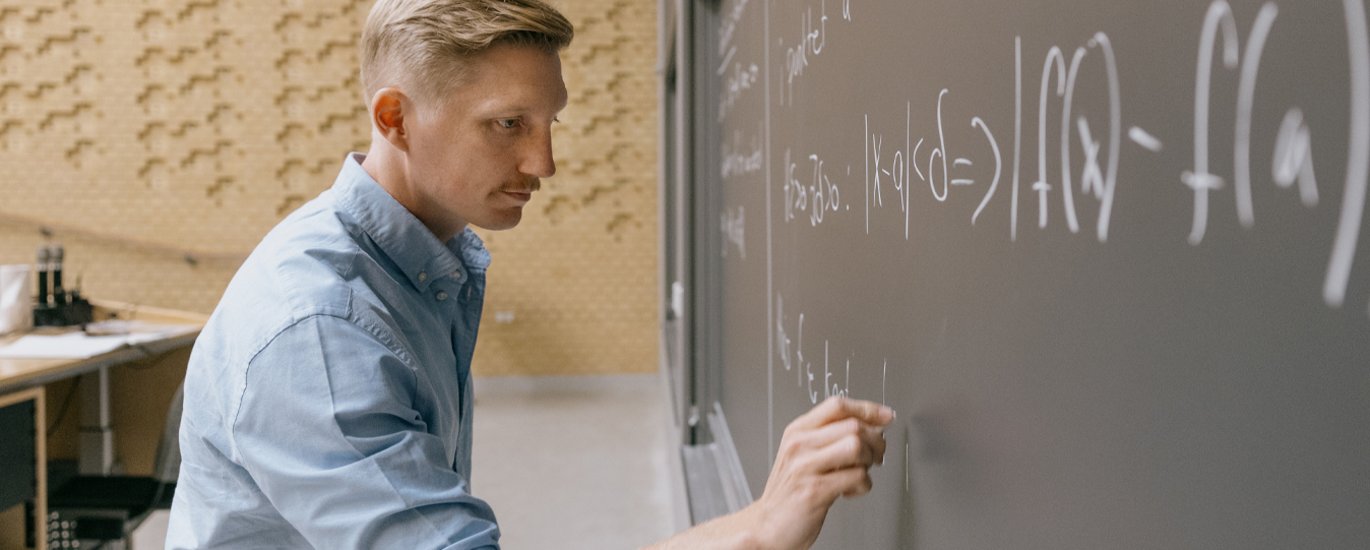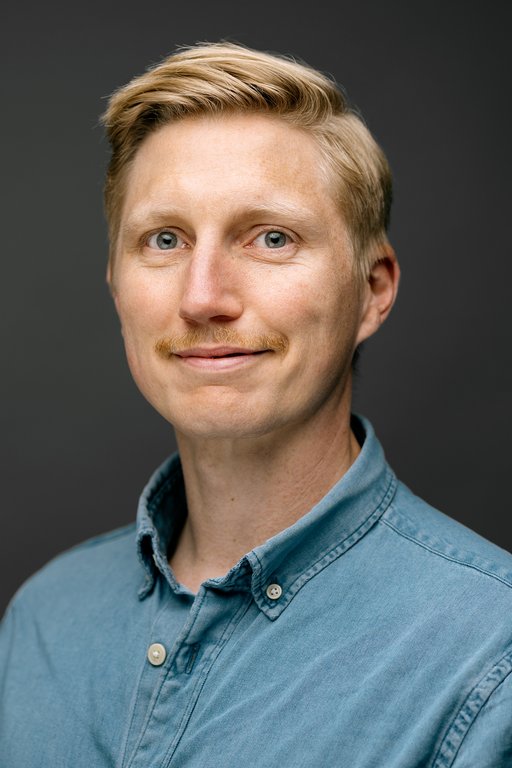He uses his own life to make maths and statistics fun
Associate Professor Mikkel Bennedsen, Department of Economics and Business Economics, has received the 2024 lecturer of the year award at Aarhus University. He is particularly interested in facilitating the transition from upper secondary school to university for new students.


The walls of Associate Professor Mikkel Bennedsen's office on Fuglesangs Alle are already adorned with three ‘Golden Pointer’ awards as visible evidence of the three times he has been nominated as the best lecturer at the Department of Economics and Business Economics. For the fifth successive year, he has been lauded as the best lecturer on the Economics and Politics degree programmes, and last year he was even nominated for the National Teaching Award under the Ministry of Higher Education and Science.
He has now also been awarded the 2024 Aarhus University Anniversary Foundation Teaching Prize, which will be presented to him during the university's annual celebration on 13 September.
And all this despite the fact that Mikkel Bennedsen teaches the methodological courses mathematics and statistics, which are traditionally perceived by many new economics students as demanding and difficult to understand. Furthermore, his lectures are usually to large classes with more than 150 students.
Nevertheless, from 2018 to 2023, Mikkel Bennedsen has time and again achieved exceptionally high scores in evaluations of his teaching, with an average of 4.9 on a 5-point scale.
"Receiving these awards is a huge pat on the back. Not least because teaching is an important area, although it may not always be as prestigious as research. So, of course, it means a lot to be recognised in this way, especially when I know how many talented lecturers are out there," says Mikkel Bennedsen, with a natural and convincing modesty.
Meets the students at their level
According to the associate professor of economics, there are many different ways to give good teaching. He himself tries to meet students at their level, so that they can relate to him and feel that he is present.
"I still remember what it was like sitting in a lecture theatre trying to keep up with what the lecturer was saying. In my opinion I teach the most exciting subjects around, and I try to exude my enthusiasm for the subjects to my students," says Mikkel Bennedsen, who also uses himself and his own everyday life in his teaching.
"Since my son came along three years ago, I've used him a lot in my teaching. After all, a child is measured and weighed constantly, and then suddenly you can turn mathematics and statistics into something more lively and understandable. If you move away from pure theory and draw on real life, you help students remember things better and you add a personal and relatable touch to your teaching. This makes the material more human and breaks down the distance between the students and myself as a lecturer, which can be challenging when you're teaching very large classes," he says.
Reducing distances
Mikkel Bennedsen also uses relevant social issues in his teaching to show how statistics and mathematics can be used to analyse and understand such issues. One result of this is that students repeatedly rate the relevance of his subject as very high in formal teaching evaluations, which is rather rare for introductory methodological courses.
In the past year, Mikkel Bennedsen has had particular focus on developing the subject of statistics on the BSc in Economics and Business Administration. Students traditionally regard statistics as very difficult, and historically the subject has had a high failure rate, which has led to students dropping out. Mikkel Bennedsen has now redesigned the course from scratch, which has not only resulted in positive evaluations, but has also more than halved the failure rate compared to previous years.
Reducing distances is very much on Mikkel Bennedsen's mind in his teaching. Including with respect to the transition from upper secondary school to university.
Collaboration with upper secondary schools
In recent years, Mikkel Bennedsen has been in close contact with upper secondary schools and teachers in order to better understand how mathematics and statistics are taught, and to understand the level of students when they arrive at university.
So far, contact has been through conversations, but this year contact will also be more practical when he visits upper secondary school classes to follow the teaching, and upper secondary school teachers have also been invited to follow his teaching in the university's lecture theatres.
"So, we’re trying to extend contact from exchanging experiences to actual practice, even though there’s a slight asymmetry in that all our students come from upper secondary school, while far from all upper secondary school students go to university. But it's so important to help students bridge the gap between upper secondary school and university as painlessly as possible," says Mikkel Bennedsen, adding that in his opinion this gap has widened in recent years.
Too much focus on computers at school
He finds that the transition from upper secondary school to university is becoming increasingly difficult for students, as the Danish school system has changed significantly in recent years, and universities have failed to keep up. This mainly concerns the use of electronic aids and forms of teaching. Some students are not used to taking notes and following classes at the same time. This is one of the reasons he hands out a set of notes to students the first time they turn up for class, so they have to take fewer notes themselves and can concentrate on following the lectures.
"My goal is to ease the transition from upper secondary school to university, from being a pupil to becoming a student.”
Mikkel Bennedsen also finds that it is harder for students to read long texts in English textbooks, and he blames the modern school system.
"Of course, it's not because the students are dumb or dumber than before, but many of them are simply not used to reading a physical textbook. My theory is that the school system has too much focus on the computer, which has largely replaced books. For example, students are taught mathematics through computer systems, which is fine as a starting point. But it is not good enough if it means that they risk losing understanding of the processes. I think about this a lot when I teach. Personally, I think that computers are used too much in the school system," says Mikkel Bennedsen.
The best job in the world
Although it may sound a bit of a cliché, you believe Mikkel Bennedsen when he says that he thinks he has ‘the best job in the world’. His enthusiasm when he talks about his work is quite simply convincing.
"I love teaching, and I love doing research. Both are my hobbies. What’s not to like?” he says.
As a researcher, he is affiliated with the new centre at the Department of Economics and Business Economics: CoRE (Center for Research in Energy: Economics and Markets), where he researches climate econometrics.
And his passion for spreading understanding and application of mathematics and statistics is well illustrated by the fact that he and a colleague are completing a textbook on the foundations of statistics and empirical studies. The target group of the textbook is students on programmes other than economics – for example PhD students in sociology and political science – who are not trained in statistics, but who would either like to learn about the subject or will use it in their studies or research.
"Writing a book has been an exciting process, and I’m lucky to have such an experienced colleague as my co-author. I've learned a lot," says Mikkel Bennedsen.